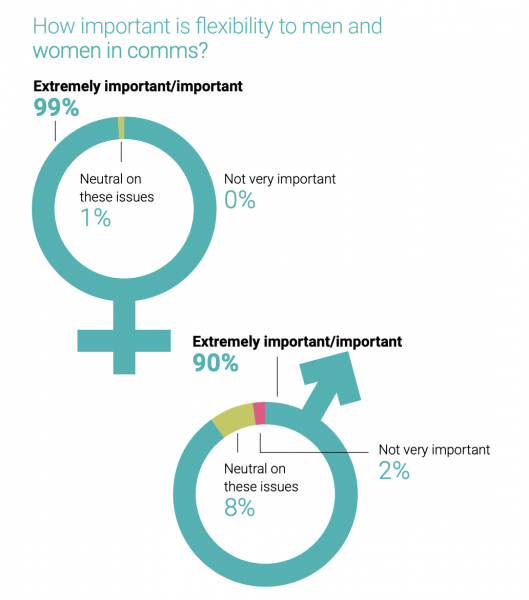
Our recent Annual Salary Guide 2020 revealed which workplace benefits are rising to the top of Corporate Comms wish lists and what’s on offer. Not unsurprisingly, the one benefit that employees want above the rest is flexible working.
Now that more people have had a taste of remote working and proven their productivity, flexibility will be the new mantra, where people will be given more freedom to choose where and how they work.
I spoke to Victoria Buchanan, Head of PR at Savills, and Tom Nutt, Head of Corporate, Europe, UK & Ireland at Grayling to get their take on how flexibility in the workplace will evolve as we start to move out of lockdown and look at the ways in which we will be working in the coming months and beyond.
How much flexibility is on offer to PR and Comms professionals?
Key findings from our survey included:
· 63% of in-house respondents have flexible working options
· Agencies lag behind with just 41% of respondents benefiting from flexibility
· These numbers are, however, an increase on the previous year’s findings (only 35% of in-house teams received this benefit; just 31% in agencies)
While the results suggest that employers are now starting to recognise that employees want flexible working options as part of their package, there is still work to be done, as the numbers have not increased enough to match the super strong desire there is for this benefit across the industry:
The numbers speak for themselves. Pretty much everyone wants flexibility in the workplace. It’s no longer one of those ‘desirable extras’; if your company is not offering it as a benefit, you stand to lose out on the best talent. And we say this, not only based on the findings of our survey, but also the conversations we have had with countless CEOs, Directors of Comms, Agency Directors and hundreds of other industry professionals – it’s the one benefit that they mention time and again.
How has lockdown impacted flexible working practices?
Looking back over the past few months of lockdown, Victoria Buchanan, Head of PR at Savills makes a valid point, “I think this time has shown that people can work from home if they need to or want to – in a way that perhaps they didn’t have the confidence to do so before.”
Everyone’s experience of remote working during the lockdown period has been different; everyone’s circumstances are different, as are the challenges that WFH has presented – home schooling, the distraction of furloughed house mates, feelings of isolation for those living alone, lack of comfortable WFH spaces. There will be many ready to go back to the office for routine, familiarity and face-to-face communication.
“I think people will make their way back and happily want to do so,” observes Buchanan. “Whether you’re in comms or not, the office will still have a purpose in terms of in-person collaboration, in terms of building up relationships which can often be strengthened face-to-face. There will be those who are keen to have that level of contact with their colleagues and their clients, and maybe there will be more people who now want to have more of a mix of working from home.”
Either way, going forward, flexibility is highly likely to become regarded as part of the employee package.
Will working practices be more flexible post-lockdown?
Tom Nutt, Head of Corporate, Europe, UK & Ireland at PR agency Grayling, says, “This time has shown more professionals that there is ingrained flexibility within a flexible working option, and I hope that there will be a greater uptake now that teams have had to change the way in which they work.”
There are people, including Nutt, who want their home space to be a sanctuary, somewhere separate from the workplace, and they will be keen to get back to the office. “I think that this time has helped people see that they can think in terms of what will work for them,” he says, “as well as what will work for everyone else. Flexibility is beholden on everyone if it works for them.”
“It's the one thing I hope will change moving forward. It takes both a cultural and a psychological shift. I hope that people will see that there are times when it is more beneficial to work from home, or to flex their hours.”
To sum up
There are many companies, like Savills and Grayling, who have a great approach to flexible working. The strong desire for more flexibility in the workplace is evident, although what companies are offering does not match this. Now we have all experienced the effectiveness of working from home, those companies that do not have flexible working practices may start to look less desirable and ‘old fashioned’ as an employer.
Companies are going to find it hard to ignore their employees’ flexible working requests as they need a good business reason to say no, and now we have demonstrated it works on a large scale, it’s going to make for some challenging conversations. The global pandemic has changed our perceptions of working from home, some more than others and what is evident is that flexible working is now firmly on the agenda and there is no turning back.
The Works Search is a search consultancy specialising in PR and corporate communications. We have unrivalled matching abilities and are known for finding the top 5% performers in the industry - the ones who deliver and make your reputation great. For more advice or market insights, do get in touch with us on 0207 903 9291 or email sarah@the-works.co.uk.
